The greatest gift my time spent living in Brasil has given me is the language. I remember being very shy about speaking to people I knew. I was always hesitant to trip over a syllable & not know how to fill the space with a word I didn’t yet know. However, with time, I got more comfortable speaking (to complete strangers that is). Much like the magnolias starting to bloom, you could smell the fragrant attempt of me interacting with the world before you saw my bud mouth bloom open. This further continued as I strengthened my fluency from experience & classes. The greatest gift learning Brazilian Portuguese has given me is the ability to learn the roots of a society I was not planted within. Now, I am able to learn from the trusted pen of Afro-Brazilian feminists. The first of many Afro-Brazilian feminist works I interacted with was Marielle Franco.
There is a list of Black folk’s names & lives that gently haunt me. This is a non-exhaustive list because if I went on I couldn’t continue writing & this email (like the motive of the state) would be forcibly clipped:
Aiyana Jones
Sandra Bland
Oluwatoyin Salau
Breanna Taylor
Sonya Massey
Sonya Massey
Sonya Massey
Marielle Franco
and the list continues…
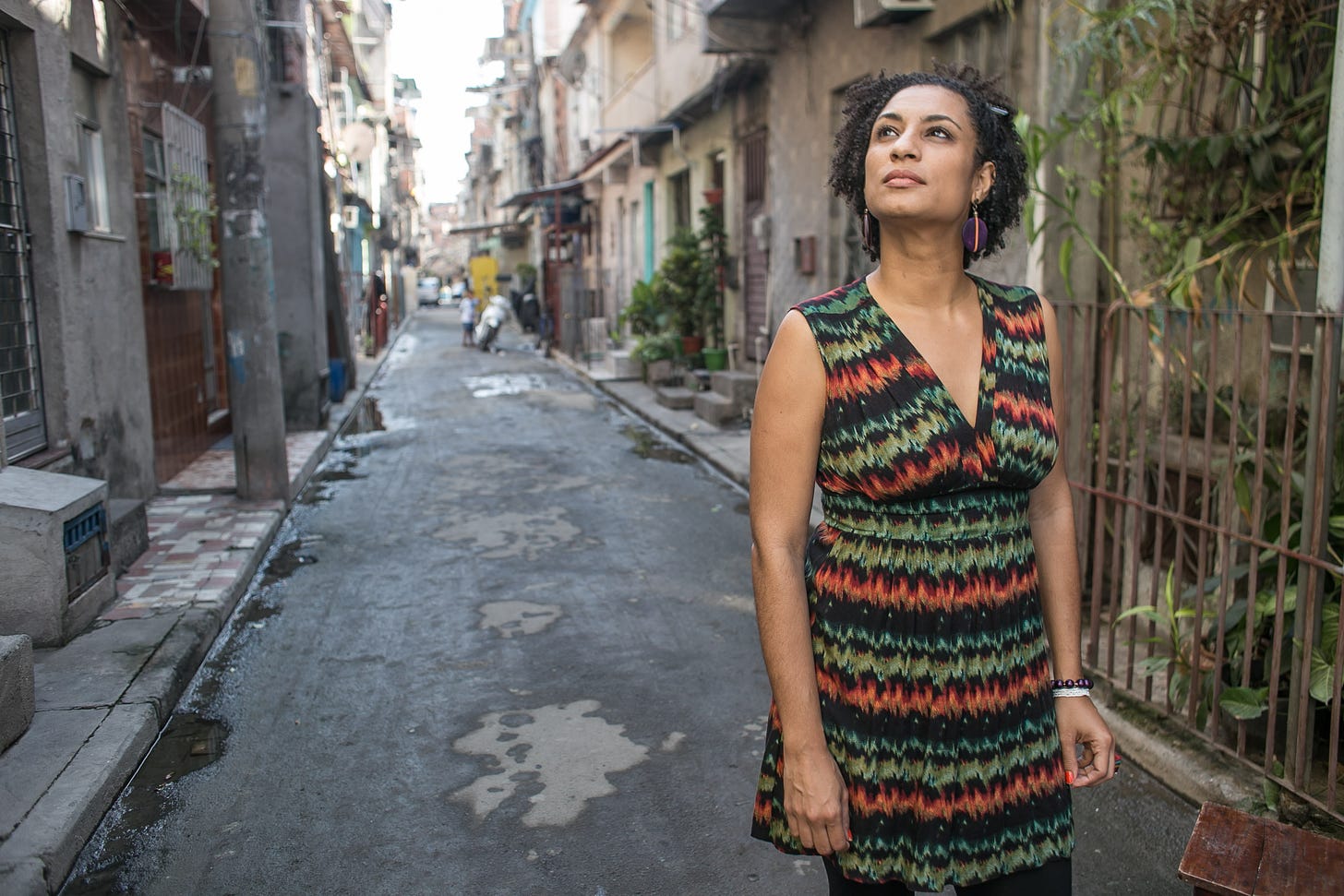
In my Black Feminist praxis, I need to be in relation with the movement not only in the belly of the empire but around the world. I believe it is essential, to engage in tracking the flight of Black Feminism knowing it can never be captured because it is always in flux. Moreover, we must follow the flight path of the movement because it has given wings to folks society has attempted to shackle. As we unruly folk know, to cite Audre Lorde in her 1981 Keynote Address The Uses of Anger: Women Responding to Racism,
“I am not free while any woman is unfree, even when her shackles are very different from my own.”
This is a value that Marielle mirrored within her 2016 campaign slogan, “eu sou porque nós somos.” This slogan translates to I am because we are. Marielle consistently acknowledged that liberation is not worked towards in isolation. We walk with folks whose names the sea spoke long before we arrived on the shore. “The river knows our names from this life, our past ones, & conjures new ones for the future.”
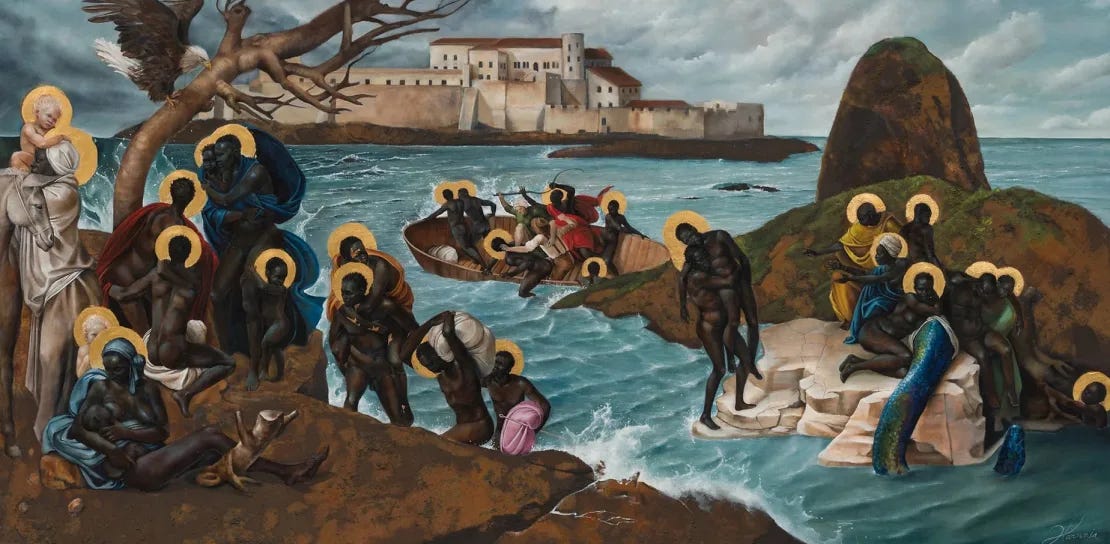
Furthermore, I admire Marielle’s insistence on citing & writing that the favela is an active site of memory. The favela may geographically be the periphery but it is in fact the center that is flooded with creativity, knowledge, & solutions for many of society’s intersecting problems. Within her master thesis, UPP – the Reduction of the Favela to Three Letters: An Analysis of Public Security Policy in the State of Rio de Janeiro, September 2014, Fluminense Federal University (UFF), Marielle reflects on the intentional physical periphery Brasil has created.
“Federal interventeur General Braga Netto declared that ‘Rio de Janeiro is a laboratory for Brazil.’ And what we see is that in this ‘laboratory,’ the guinea pigs are black, from the periphery, from the favelas, workers. People’s lives cannot serve as an experiment for security models.”
“[The] characterization of the favelas, as places of danger, of fear, that spreads through the city, evokes the myth of dangerous classes […] placing the favela as object and public enemy number one.”
Interrogating the definition & consequences of increased security, we see Marielle pulling the thread from woven narratives that have never supported working Black folk. Yet, the ideological language, at every turn, expresses otherwise. Instead, Marielle centers an expansive language that speaks to holding the beauty that can be found in places where nothing was expected to thrive.
“As rosas da resistência nascem no asfalto. A gente recebe rosas, mas vamos estar com o punho cerrado falando de nossa existência contra os mandos e desmandos que afetam nossas vidas.”
“The roses of resistance are born in the asphalt. We receive roses, but we will be with our fists clenched speaking of our existence against the push and pull that affects our lives.”
So often, the archives are filled with murky documentation that we must be skeptical of. We must leave room for the more than likely chance that those we turn to from the past words’ were improperly documented.
Harriet Tubman dictated her biography to Sara Bradford to write.
Sojourner Truth dictated her biography & had help getting it published by Oliver Gilbert.
And the list continues…
Therefore, when we get to witness these Black Women thinkers, intellectuals, & artists through their own trusted pen there is no need for raised eyebrows. Reading the work produced by Black Women using their own pen eliminates the need for annotated question marks of insincerity in the margins. We can trust their speech becomes a written stream of their consciousness for us to fully surrender to.
In regards to language & translation, the stream is lined with grammatical stones that only exist in their site (of memory). This is why I continue an active Portuguese language learning practice. Because I want to flow with the Afro-Brazilian Feminists’ stream of consciousness. Learning Brazilian Portuguese lets me trust the memory that “eu sou porque nós somos.” This lets me tackle the roots of tyrannical oppression trying to steal breath from me, from the Congolese, from the Sudanese, from Palestinians, & from Brazilians.
You can not outrun the licorice chord circuits of empire or antiblackness. You can move to improve specific aspects of your quality of life (such as free healthcare). However, we must also acknowledge that Paradise has the potential, & often does, to replicate harm & violence masqueraded as secure freedom dreams.

When you journey to a new place, you will encounter the totality of the specific site of memory that you have stepped foot on. Perhaps the way to break the circuit is by breaking away from the disillusionment of the separation between land, history, & people. The water remembers, the land swells, the trees scar, & the people’s stories sing through sunlight illuminating the map of spatial time.
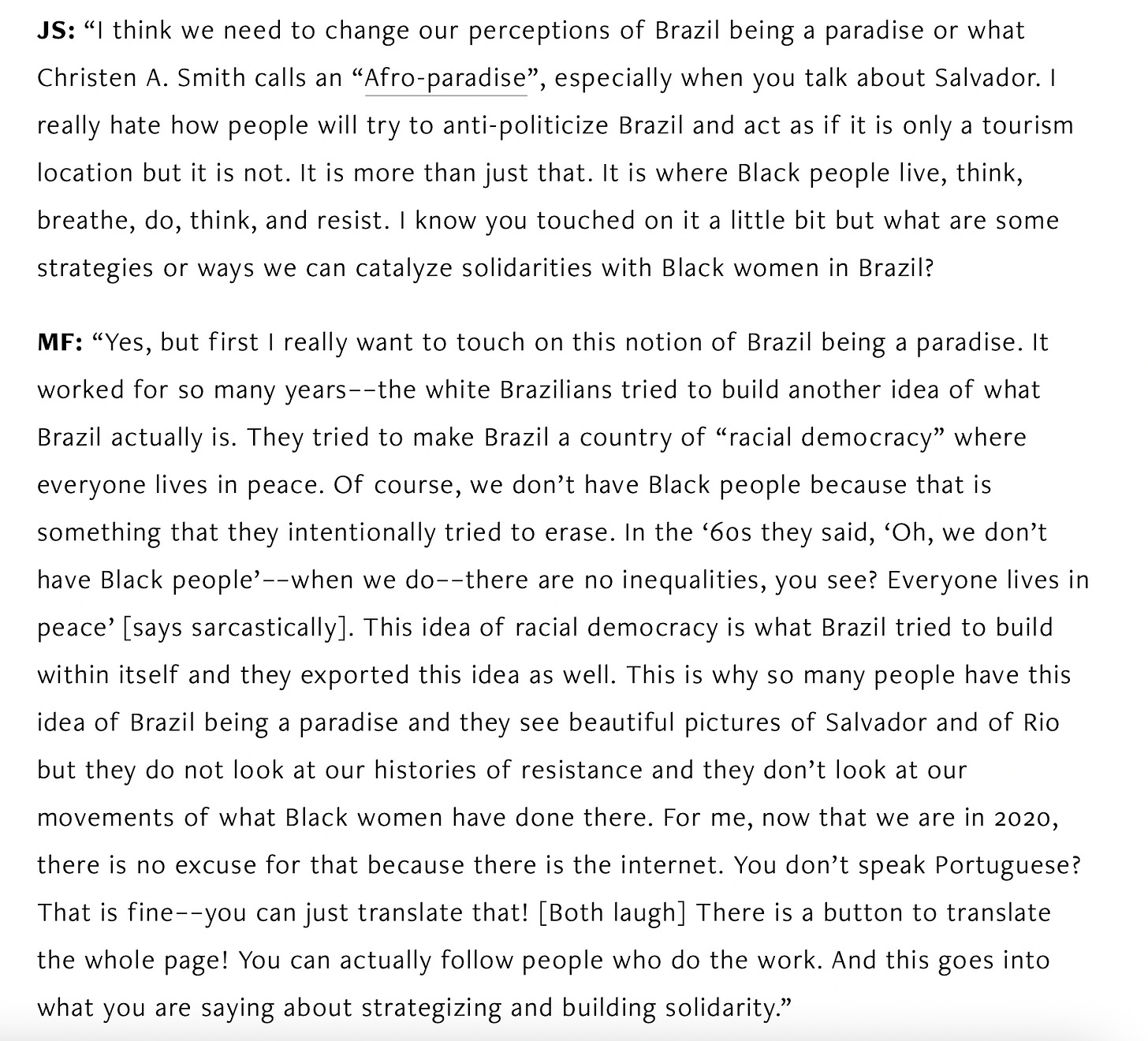
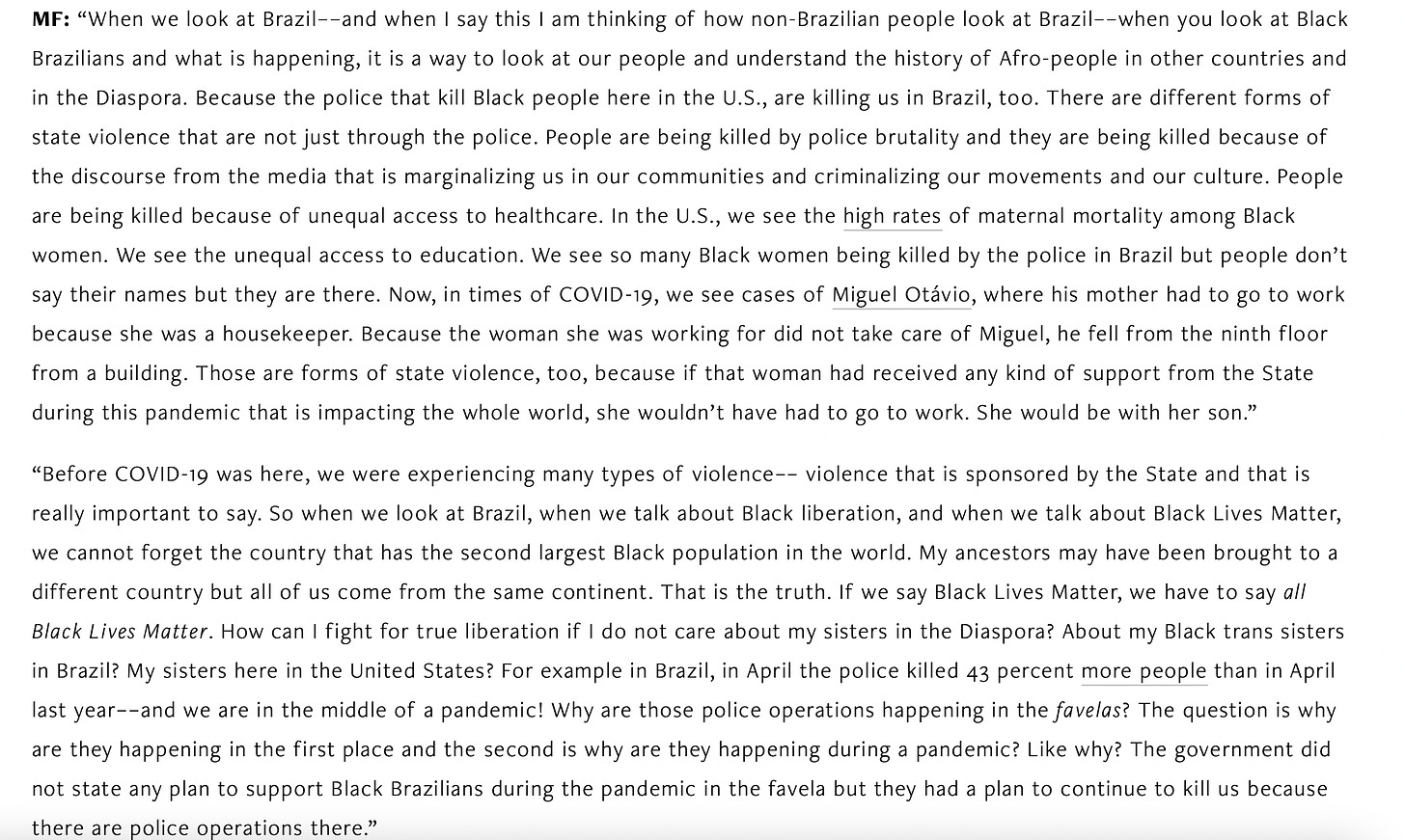
The principles of intersectionality are ones that Marielle championed as a Black bisexual feminist and politician from the Complexo da Maré favela of Rio de Janeiro. The Audre Lorde quote, “I am not free while any woman is unfree, even when her shackles are very different from my own,” is one of the last documented things that Marielle publically stated. Marielle recited this quote while speaking at Casas das Pretas (Black Women’s House) on March 14th, 2018. Unfortunately, after leaving the event both Marielle & her driver Anderson Pedro Gomes were shot, murdered, & we now know assassinated.
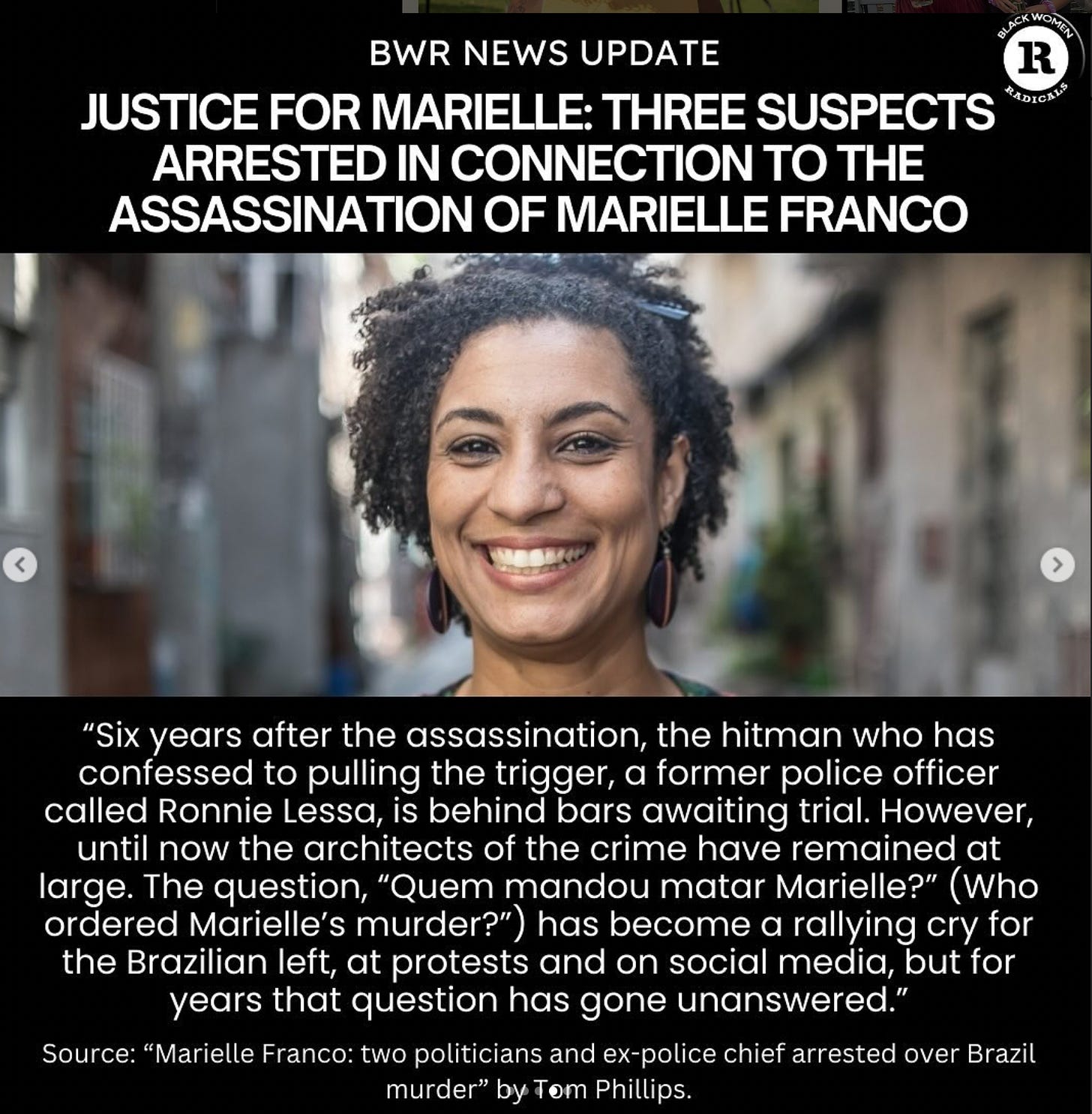
Six years went by while people chanted “quem mandou matar Marielle.” Six years went by and no one possessed a sense of urgency because Black girls & women disappear in clouded-heavy smoke. The theatre of mushroomed carbon suspended in the air holds attention longer than the source of our burning bodies. The state & media fan the smoke not to make it disappear faster but to make it linger longer. Black girls turned women turn to smoke—visible exhalation from an exhausted body—revered in sighing particles rather than whole. Diffused carbon is more valuable to some than diffused oxygen wandering through a living body. Six years went by as the smoke fanned but it never fully cleared. Those who ignore the smoke will still feel the consequences—choking from illusionary ignorant bliss.
I dream of my work burning whole like a star & sighing all the smoke out of the bells & whistles of my body. My smoke choking whoever denies the bright trail I scorch through the sky. I dream of being revered whole & kept alive.
Therefore, while the investigation is taking place, Black Feminists keep Marielle whole & alive through the rallying cry Marielle, Presente (Marielle is here). Marielle, Presente keeps Marielle whole & unpunctured. Marielle, Presente protects the dispersion of the state’s dismemberment of the ancient site of memory that is a person. This call & response stems from the same place that moved Harriet into action by saying the words my people are free. When we chant Palestine will be free we are reaching back into the same well of sustenance & liberatory imagination. We continuously incant the future knowing each present second plunges us forward in a time we actively create.
It has become increasingly clear to me, like how Imani Perry urges us to look South to understand the soul of the United States, that we must look to the Global South & beyond the belly of empire to understand the soul of desire, devotion, & life that white supremacist capitalist patriarchy (bell hooks) vehemently tries to deny us the ecstasy of feeling.
We are still here!
Marielle is here!
Marielle, Presente!
Below, is one of my favorite contemporary Brazilian songs by Ludmilla entitled A Preta Venceu! The narrative of the song tells the story of Ludmilla’s roots in Caxias to being an international star. In many ways, it has become an anthem for Afro-Brazilian women due to Ludmilla expressing the challenges & beauty of being a Black bisexual woman in Brazil. In this performance, Ludmilla & audience members are moved to tears. When I listen to this song it also makes me emotional considering the joint struggles Black Women face all over the world. That’s why an international Black Feminist Praxis is necessary to truly run wild & get free.
Please use the Black Women Radicals free database to learn more about Black Feminists rooted in a land you currently are not. Additionally, feel free to name any Black Feminists whose work is not centered in the west in the comments below! I would love to dive into their work & continue to deepen my practice.
Ludmilla is singing in Portuguese but I have translated some of my favorite lines from the song below.
Acabei de passar no bairro onde eu morava, nossa Wow, I went past the neighborhood where I used to live Ainda tem a pracinha que a gente brincava There is still the small square where we used to play É Raiz, lá eu fui tão feliz It's roots, I was so happy there
Era correria pra caramba, muito sonho e pouca grana There was lots of work, lots of dreams & little money Só quem tava lá pra saber como foi The people who were there know how it was Eu pedi tanto uma chance só I asked for one chance Sonhei de um jeito, e Deus fez melhor I asked one way, & God did it much better
A preta venceu, encheu a mamãe de orgulho
The Black girl won, made mom proudFoi de Caxias pro mundo
From Caxias to the worldP.S. Here is a special song that I listen to often when this world gets to me & demands me to save it at every turn. This song has been on repeat, along with Ludmilla, as of late. This is a lullaby specifically for us by us 🤎.
Please remember if you choose to quote this piece, share this piece, or any piece on this publication to always CITE BLACK WOMEN. Please always include my name (Kay Brown she/her pronouns) and a link to the publication of the Assemblage: Baby’s Breath substack in your sharing practice.
To further support my writing practice, receive additional offerings that connect to my pieces, & be the first to hear about other ways to engage in the theory of Assemblage, please consider becoming a paid subscriber. Soon I will invite fellow unruly folks to practice gathering & honoring with me in a generous clearing ✨. Stay tuned for updates!
Lastly, remember, that referrals are now available! This means you get to speak the name Assemblage: Baby’s Breath out loud to your community while receiving unique grounded gathered gifts from me. Thank you for being here 💙.






“I dream of my work burning whole like a star & sighing all the smoke out of the bells & whistles of my body. My smoke choking whoever denies the bright trail I scorch through the sky. I dream of being revered whole & kept alive.” Damn. That is incredible writing 👏🏽👏🏽👏🏽